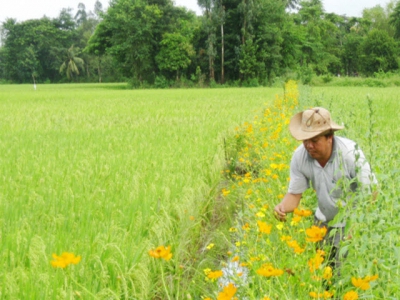Develop environmentally friendly agriculture

The Plant Protection Department and the Vietnam Gardening Association signed a cooperation agreement to apply technological advances to develop safe, sustainable, and environmentally friendly agriculture.
On November 4, the Plant Protection Department and the Vietnam Gardening Association signed a cooperation agreement "Propaganda and advocacy for applying technological advances to promote agricultural development in the direction of safety and sustainability, environmental friendliness."
Mr. Hoang Trung, Director of the Department of Plant Protection, and Mr. Nguyen Xuan Hong, Chairman of the Vietnam Gardening Association, said that the cooperation agreement would promote the strengths of each party, and develop environmentally friendly agriculture, efficient goods, sustainable, adaptive to climate change.
Through this cooperation, the two sides will promptly advise and criticize policies and propose solutions to new problems arising in production under the Department of Plant Protection management.
Regarding information, the two sides cooperated in propaganda and knowledge dissemination to raise awareness of members, the community, and the whole society about plant protection to develop environmentally friendly agriculture, and adaptive to climate change through the practical application of IPM and IPHM principles into practice, with high community involvement.
Simultaneously, the two sides cooperated to raise awareness on responsible management and use of inputs in agricultural production (varieties, pesticides, fertilizers,...); packaging collection; issue the planting area code.
On the part of the Plant Protection Department, the unit will organize technical and Gardening training through the development of documents and the development of IPM and IPHM programs on vegetables and fruits; guide the technological process on breeding natural enemies for pest control; guiding the application of farming methods to conserve the field ecosystem sustainably, minimize the harm of plant pests (landscape model, sustainable production...).
The Department of Plant Protection and the Vietnam Gardening Association hope that the above activities will be promoted more widely by units to create many effective and safe garden models.
In addition, the parties hope to receive the attention and support of local specialized agencies and relevant levels and sectors to overcome current difficulties and challenges, contributing to the development of a clean, chain-linked, high-value and sustainable agriculture.
In addition, the two sides cooperate in developing and implementing programs and projects to improve the capacity of food safety assurance, integrated plant health management, and the application of biological products to replace chemical drugs, toxic chemicals, organic fertilizers, etc. in the development of the garden economy in the direction of circular agriculture and organic agriculture to create safe and organic products, improve production efficiency, and protect the environment and public health.
The two sides will transfer technical advances during the cooperation process, deploy and replicate model garden models in the organic direction in building model-new rural areas, and demonstrate IPM, IPHM, and technology models, the use of organic fertilizers, biological pesticides, biological struggle, weather forecasting, and pest warning models, the use of modern spraying equipment, and production models of fruit and vegetable chains safe and effective for sustainable garden economic development.
The Vietnam Gardening Association will give advice and criticism in developing policies and solutions to improve the quality and effectiveness of state management in plant protection and agricultural economic development policies.
On November 5, the Plant Protection Department will also sign a cooperation agreement with Dong Thap Department of Agriculture and Rural Development and An Giang Department of Agriculture and Rural Development on the development of planting area codes and models of economic use of fertilizers and pesticides, effective for key crops with export potential in the two provinces.
This agreement aims to promote the strengths of each party, jointly implement the development of planting area codes and models of economic and effective use of fertilizers and pesticides for key crops with potential for export to develop agriculture in the direction of goods, efficiency, sustainability, and adaptation to climate change.
Many countries have required Vietnam's fruit for export to have a growing area code, typically Australia, the US, China, etc. Even easy and frequent markets trading with Vietnam have begun to apply the import conditions that must be traced back to the origin and the growing area code.
The growing area code is a certification identifier to monitor and control its production and quality easily. When circulating on the market, all kinds of products and agricultural products need to originate in that growing area to combine with a traceability solution.
Có thể bạn quan tâm
 Restoring fruit sector-key task of the Mekong Delta
Restoring fruit sector-key task of the Mekong Delta Fruit sector is one of the three strengths of the Mekong Delta, so restoring and stabilizing it is an important task that localities within the region have been
 The qualitative transformation of Vietnam’s rice
The qualitative transformation of Vietnam’s rice The structure of Vietnam's rice for exports has shifted towards increasing the proportion of high-value-added rice varieties and reducing the rate of low-grade
 Scaling up a rice growing model in the Mekong Delta in response to climate change
Scaling up a rice growing model in the Mekong Delta in response to climate change After a year of piloting, the model on 'rice farming transforming to adapt to climate change' has been evaluated and is ready to be expanded throughout